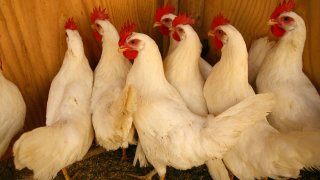
Lee la historia en español aquí.
A case of highly contagious avian flu has been found at a commercial poultry farm in Lancaster County.
Over the weekend the Pennsylvania Department of Agriculture confirmed the state's first case of Highly Pathogenic Avian Influenza. It was found in a flock of commercial chickens in East Donegal Township, Lancaster County.
The farm and all commercial poultry facilities in a 10-kilometer radius are quarantined, and a state and federal task force is initiating a response plan.
Get Philly local news, weather forecasts, sports and entertainment stories to your inbox. Sign up for NBC Philadelphia newsletters.
According to the CDC, there is no immediate public health concern for Pennsylvanians. No human cases of avian influenza viruses have been detected in the United States.
Poultry and eggs are safe to eat if cooked properly.
However, HPAI is spread easily and can be deadly to chickens, ducks, geese and other birds.
Local
Breaking news and the stories that matter to your neighborhood.
Tens of millions of birds have already died across the country due to the outbreak, including many which were slaughtered. Officials are calling this the worst outbreak of avian flu since 2015.
Consumers likely already noticed one direct effect of the avian flu: the high cost of eggs. They cost nearly three times as much as they did last year, according to market researchers.
The outbreak has spread across at least 27 states to date, including most states surrounding Pennsylvania. But Lancaster County's new case is the state's first since the early 1980s.
“Protecting Pennsylvania’s $7.1 billion poultry industry is a year-round top priority,” said PA Agriculture Secretary Russell Redding. “We have strict biosecurity protocols in place both for Pennsylvania farms, and for poultry products shipped in and out of the state. We have had $2 million budgeted and set aside since 2016 to respond to avian influenza, in addition to equipment, supplies, laboratories and highly trained experts who have been on high alert and are supporting our poultry farmers."
Birds shed the virus through their droppings and nasal discharge. Experts say it can be spread through contaminated equipment, clothing, boots and vehicles carrying supplies. Even mice can track it.
Reading asks anyone visiting a farm to clean their shoes and vehicles, and stay away from poultry barns, in order to help protect the state's farms.



